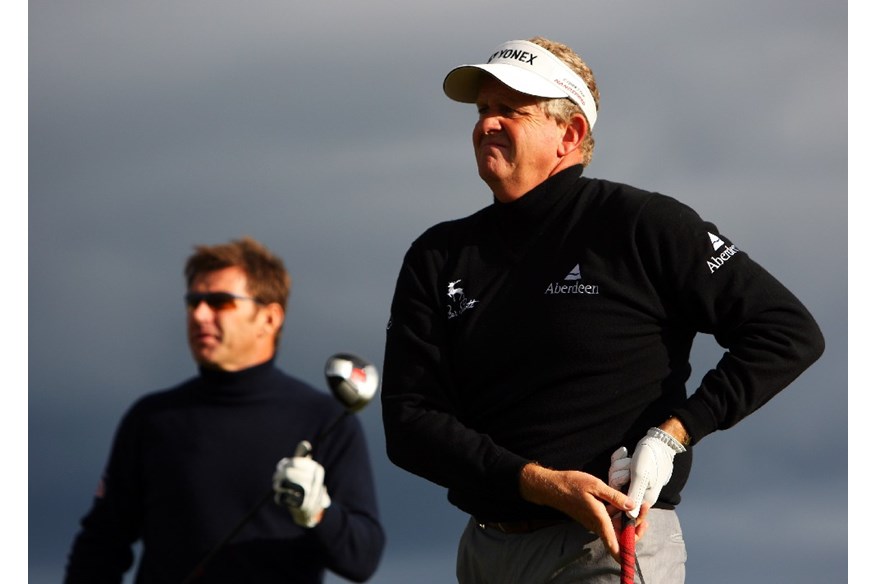Oct24 Monty and Faldo
Last updated:
Nick Faldo pretended to have trouble understanding the question through a telephone line piped into a sound system at Valhalla Golf Club. Perhaps that was because the subject was his recent criticism of Colin Montgomerie.
On another occasion, however, he came through loud and clear, even though he didn’t mention Monty by name.
“Match play, putting is unbelievably important,” Faldo said. “It covers up a multitude of sins. You’ve got to be a good putter to play match play, and I think you get that from the psychology of match play. You’re not worried about, or not thinking about, the next stroke. There’s no lagging, or very rarely.”
It was another dose of insight from Faldo, whose credentials surpass any previous Ryder Cup captain for Europe.
Along with his six majors, he has participated in 11 Ryder Cups and won more points than anyone in its 80-year history. He also has spent time on just about every television channel as an analyst, which has enabled some of his contemporaries to finally get an idea what was going through his mind during all those years of winning.
Still, there might have been more to his comments Monday than how to putt.
Considering his history with Montgomerie, the most recent example coming two weeks ago when Faldo criticized him for skipping meetings at the Seve Trophy, there seemed to be an indirect message to the surly Scot.
Don’t expect any favors.
Europe only last month began its Ryder Cup qualifying. Now is not the time for Montgomerie to panic, but he began the year at No. 17 in the world ranking and already has fallen to No. 53. His putting has been the weakest par of his game, as always, and for someone who will turn 45 next year, age certainly isn’t going to help that.
Montgomerie has played in every Ryder Cup since 1991. His 23 points are second only to Faldo and Bernhard Langer. He has never lost a singles match, and one more singles victory would break the Ryder Cup record he shares with the likes of Faldo, Billy Casper, Arnold Palmer and Sam Snead.
Yet, that won’t assure him a spot on the team, especially not with Faldo as the captain.
They were contemporaries, but rarely rivals. Montgomerie narrowly beat him to capture his first Order of Merit in 1993, but Faldo spent the rest of his decade focusing on the PGA Tour, the toughest tour in golf, where Monty never won.
Their social relationship began to slide in 1999, two weeks before the Ryder Cup. Faldo was at the Canadian Open when he was asked why Montgomerie, who was on his way to a seventh consecutive Order of Merit, had never tried to spend a full season on the PGA Tour.
“I’m surprised he hasn’t thought of doing something different as a challenge,” Faldo said. “But hell, I think he likes to earn his fat checks each week, which is no harm in that, I guess. If you’re motivated by that. A few are. Most of us go for 10 claret jugs.”
Montgomerie was hurt. European captain Mark James was so outraged that when Faldo wrote the team a note wishing them well, James tore it up and tossed it in the trash.
Now that Faldo is captain, he will do things his way, take who he thinks are the best players and apologize for nothing.
As captain of the Seve Trophy – matches between Britain and Ireland against continental Europe – he left Paul McGinley off the team, meaning there would be no Irishman at a tournament in Ireland. It took an uglier turn when McGinley then resigned as Faldo’s vice captain for the Ryder Cup, saying he wanted to concentrate on making the team.
That was merely a scene in the Ryder Cup soap opera, and many more are likely to play out over the next 11 months.
What really caused a stink was when Faldo criticized one of his players in the press, taboo for a captain.
“Monty’s a tough one,” he told the Times of London. “He was the only one whose emotions I had to deal with. He only came to two of the five team meetings, so that was disappointing. Then he had to be teased out onto the 18th green to support his team. The bottom line was that he hadn’t won a point. That’s why I sent him out first in singles. That’s the place to get a point. And he did.”
Two past captains, Bernard Gallacher and Sam Torrance, quickly rose to Monty’s defense. They said he was the consummate team player, Faldo was anything but that and Faldo would learn from his mistake.
“No fallout,” Faldo said tersely when the question about his criticism of Monty finally came through clearly.
Maybe he was being smart not to stir the pot again. Then again, it’s hard to believe he made his comments to the Times without realizing the ramifications. All that can be certain is that Faldo will do things his way, just as he did when he became the world’s No. 1 player.
“I’m me and I will do what I feel is best,” he said. “I know what I can bring to the team.”
One of the most amazing transformations in golf was from Faldo, the prickly superstar with few words and even fewer friends, to Faldo, the golf analyst with a dry wit who can’t stop talking. He probably would host infomercials if The Golf Channel would let him.
Being a captain makes him competitive again.
“My days of winning majors have gone, and now this is the biggest project in my golf career right now,” he said. “So yes, it’s very important to me.”
There is an aura about Faldo that appeals to a younger generation – Paul Casey, Nick Dougherty, Luke Donald – who grew up with Faldo as the face of European golf. His contemporaries, such as Torrance and James, have experienced the selfish side of Nasty Nick.
But they won’t be playing for him.
And if Montgomerie doesn’t make the team on his own, he might not be, either.

